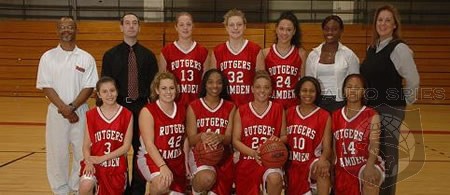An Opportunity to Rethink Strategies
Bryan Monroe: 7 Days That Changed the Media World
From the archives: April 14, 2007: After Imus, sights set on rap music
Some Say News Media Have Ignored Issue
Drama Said to Show Internal Clout of Blacks, Women
(Last day to donate this year!)
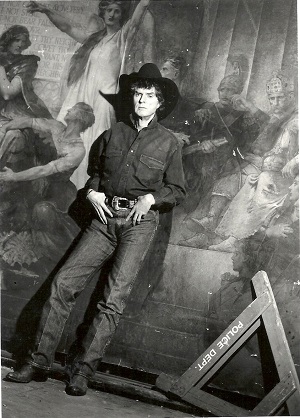
An Opportunity to Rethink Strategies
The 2007 campaign to evict shock jock Don Imus from his media perch over racist remarks was arguably the most effective step ever taken by the National Association of Black Journalists since its founding in 1975.
Now that Imus (pictured; credit imus.com) has died at age 79, what lessons should be our takeaways in 2019? Foremost should be seizing the opportunity to reevaluate the strategies for diversity and inclusion being used by the journalists-of-color organizations.
For sure, NABJ does not deserve all the credit for dislodging Imus after he called the Rutgers women’s basketball team “nappy-headed hos.” But as then-NABJ President Bryan Monroe points out in the piece below, it collaborated with activists such as the Rev. Al Sharpton and with allies both white and of color within CBS and NBC, two outlets that transmitted the shock jock.
Imus may be gone, but the issues his reign represented are still with us. Shock jocks are out of the limelight, but the lack of civility is worse, emanating from, of all places, the White House. Presidential acolytes among Fox News commentators provide a permanent home for dog-whistlers and those who insult immigrants and would- be immigrants.
The paucity of people of color in key positions in the broadcast and cable networks, and their successors in the media ecosystem, remains.
In August, NABJ awarded one of its Thumbs Down awards to CNN. The association said in a July 15 news release, “NABJ continues to call upon CNN to elevate and hire black employees with critical and executive-level, daily news-decision making roles. We are approaching nearly 150 days since NABJ publicly called for change at CNN and requested meetings with its leadership and parent organizations. NABJ’s requests also included a civil rights audit of its hiring and promotion practices. . . . “
However, CNN has continued its refusal to meet as long as Roland Martin, former CNN commentator and NABJ’s vice president-digital, is part of the delegation.
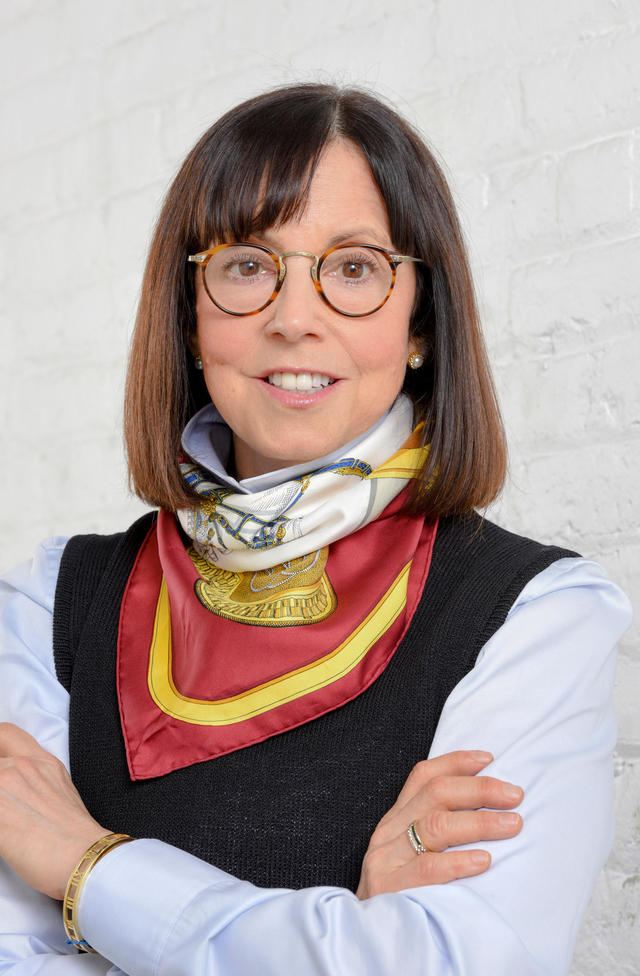 None of the networks has yet named a person of color as president of its news division, but at CBS, the internally popular Susan Zirinsky (pictured) is demonstrating what can happen when a woman gets that job. Zirinsky was named just after 2019 began, following sexual harassment scandals at the network, and since then Norah O’Donnell has become anchor and managing editor of the “CBS Evening News.” Despite plummeting third-place ratings, Zirinsky says, “We’re just getting started — ratings are not the sole measure at this time.”
None of the networks has yet named a person of color as president of its news division, but at CBS, the internally popular Susan Zirinsky (pictured) is demonstrating what can happen when a woman gets that job. Zirinsky was named just after 2019 began, following sexual harassment scandals at the network, and since then Norah O’Donnell has become anchor and managing editor of the “CBS Evening News.” Despite plummeting third-place ratings, Zirinsky says, “We’re just getting started — ratings are not the sole measure at this time.”
Meanwhile, Latinos, Native Americans and other people of color complain that advancement is slow throughout the industry.
In November, Keith Woods, NPR’s vice president of newsroom training and diversity, said hiring more Latinos remains a “chronic need,” even as the newsroom has “in fact increased the number of Latinos hired. . . . the pace of change is too slow against the challenge. And if we’re looking to … if we’re seeking to look and sound American, then we have to put our foot down on the gas on that seriously.”
Native Americans continue to be ignored as some mainstream news organizations continue to refer to recent mass killings as “the deadliest mass shootings in U.S. history,” ignoring the deaths at gunpoint of Native people and African Americans in the 19th and early 20th centuries. The name of the Washington football team continues in wide use despite the protests of the Native American Journalists Association and others. A recent NAJA news release complained that the New York Times is not taking the group seriously.
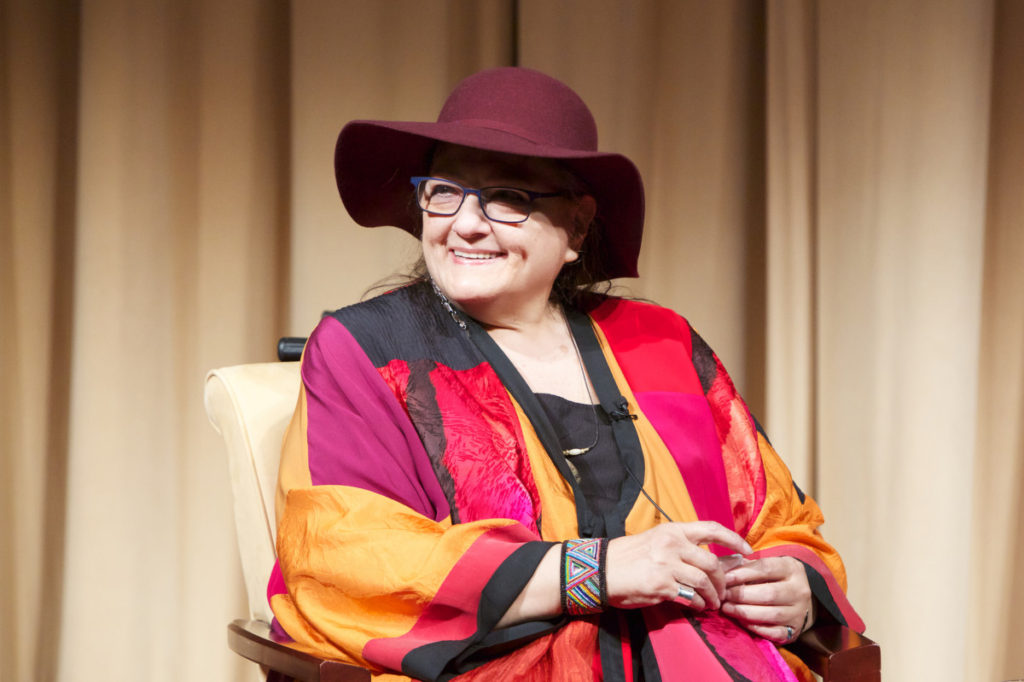
“The Imus story still matters as long as there are ”’Indian” names, mascots and other references in American sports, and as long as comedians and talk show hosts continue to make fun of Native peoples who are trying to do something to get rid of them,” Native activist Suzan Shown Harjo, who has been a NAJA board member, wrote at the time.
The Imus ouster was aided by the presence of CBS board member Bruce Gordon, a former president of the
NAACP, who called on then-CBS Corp. CEO Les Moonves to fire Imus, and an NABJ alliance with Sharpton, who leads the National Action Network.
“I think Imus highlighted the need for diversity in news media management,” Bob Butler, a former NABJ president who conducted a diversity census of news management as vice president/broadcast, told Journal-isms by email on Sunday. “What Imus said would normally have been shrugged off. But this time there were influential people of color who wouldn’t let this become business as usual.
“Paula Madison — and the Black employees — at NBC made it clear that this was not something that would just pass. . . . ” Madison was NBC diversity chief, general manager of KNBC-TV in Los Angeles and regional general manager of Spanish-language stations KVEA-TV and KWHY-TV at the time.
“I think Ken Chenault at American Express played the biggest role by pulling advertising from the Imus show. I recall other companies . . . followed suit.
“Having people of color in positions of authority played a large role in Imus’ show being cancelled by MSNBC and CBS Radio.”
As Monroe reports below, Sharpton “turned out to be a deliberate, smart, strategic partner in this fight. For nearly two hours, we talked about strategy, choreography, and, most importantly, how we each needed to ‘stay in our lanes.’ His was civil rights, activism and pressure on the advertisers. Ours was journalism, free speech and accountability.”
As for representation by people of color on corporate boards, such as Gordon, an organization called the Alliance for Board Diversity conducted a census in 2018 of Fortune 500 boards and concluded, “While there have been a few gains for some demographic groups, advancement is still slow. This movement is also not representative of the broad demographic transformations that have been seen in the United States over the same period of time.”
Alliances with politicians and activists such as Sharpton can be tricky. In 2011, NABJ announced that, frustrated by job losses in its membership, setbacks in diversity efforts and a perceived decline in news that benefits African American communities, it would reach out to elected officials as it sought allies to reverse these trends.
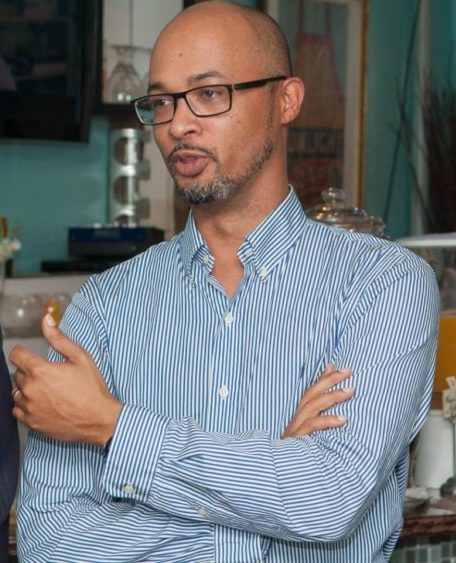 “NABJ’s mission is to connect with the black community,” then-NABJ President Gregory H. Lee Jr. (pictured; by George Dalton Tolbert IV) said at the time. “The community involves pastors, school teachers, lawyers and yes even politicians,” Lee told Journal-isms.
“NABJ’s mission is to connect with the black community,” then-NABJ President Gregory H. Lee Jr. (pictured; by George Dalton Tolbert IV) said at the time. “The community involves pastors, school teachers, lawyers and yes even politicians,” Lee told Journal-isms.
But though all of the journalist of color organizations say they want ties to their communities, it has not always been easy for journalism groups to draw the line between honoring journalistic principles and working with potential news sources. Lee contended that “NABJ is a non-profit organization, which doesn’t deliver news, it trains and educates members on being better journalists and better professionals.”
Perhaps the greatest challenge for journalists of all stripes lies in responding to the thoughts underlyng the “nappy-headed hos” comment.
Lee messaged Journal-isms on Sunday that he was in his first term as NABJ Sports Task Force chair when the Imus flap erupted. “I remember at the time that the NABJ Sports Task Force was re-establishing itself in the association and wanted to make an impact in our industry when it came to diversity issues in sports. At the time, I remember contacting President Monroe that the organization needs to speak out on this because this was bigger than sports, and the perpetuation of these stereotypes and derogatory language was a bad look for these media companies broadcasting him. Now 12 years later, sports and race are a big part of the national dialogue.
“I understand that many of the obituaries of Imus focused on his career achievements as a radio trailblazer and his 2007 comments treated as a footnote. Today, we should reflect on those comments as not just a footnote but just another example of why groups such as the National Association of Black Journalists exist. Imus’ death reminds us the fight is still an ongoing one.
As Fairness & Accuracy in Reporting pointed out at the time, Imus had a long history of racist comments.
“Imus himself has referred to African-American journalist Gwen Ifill as ‘a cleaning lady,’ to New York Times sports [columnist] Bill Rhoden as ‘quota hire’ and to tennis player Amelie Mauresmo as ‘a big old lesbo,‘ ” the organization wrote.
In his Times column, Rhoden wrote in 2007, “For all the ugliness of the remarks, I’m encouraged by the controversy they’ve unleashed. So many of our young people, especially women, especially African-American women, have been raised in cocoons, led to believe that sexism and racism have significantly subsided. This naïveté is so entrenched that the threshold to insult has become higher. . . . Imus’s comments highlighted age-old, deep-rooted stereotypes that seem to surface whenever African-American women excel in sport. . . .”
Subsequent coverage of tennis superstar Serena Williams can confirm that such concerns have not gone away.
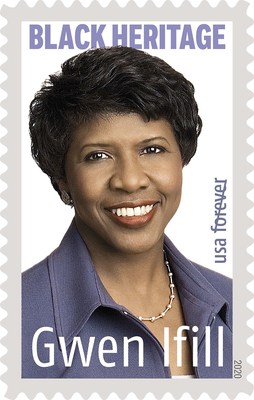 Ifill, who died in 2016 and for whom a postage stamp is to be unveiled on Jan. 30, responded to Imus in a column in the New York Times.
Ifill, who died in 2016 and for whom a postage stamp is to be unveiled on Jan. 30, responded to Imus in a column in the New York Times.
“Every time a young black girl shyly approaches me for an autograph or writes or calls or stops me on the street to ask how she can become a journalist, I feel an enormous responsibility,” Ifill wrote. “It’s more than simply being a role model. I know I have to be a voice for them as well.
“So here’s what this voice has to say for people who cannot grasp the notion of picking on people their own size: This country will only flourish once we consistently learn to applaud and encourage the young people who have to work harder just to achieve balance on the unequal playing field.
“Let’s see if we can manage to build them up and reward them, rather than opting for the cheapest, easiest, most despicable shots.”
- Greg Braxton, Los Angeles Times: Don Imus, pioneering talk-radio host and shock jock, dies at 79
- Christopher Kelly , NJ Advance Media for NJ.com: Don Imus is dead at 79, but not everyone is grieving. See how the Internet reacted.
- Zack Linly, the Root: Don Imus Dies At 79…but Anyway, What Y’all Having For Breakfast?
- Paul Meara, BET.com: Twitter Reminds Don Imus Apologists Of His Racist Past
- Lorraine Wheat, Variety: Hollywood Sends Mixed Reactions on the Death of Don Imus
The Rutgers University women’s basketball team, 2007. “That game had to be the biggest moment of their lives, and the outcome the biggest disappointment,” Gwen Ifill wrote. “They are not old enough, or established enough, to have built up the sort of carapace many women I know — black women in particular — develop to guard themselves against casual insult.”
7 Days That Changed the Media World
By Bryan Monroe (pictured below)
Don Imus died last week. There are those who mourn his loss.
For me, Imus represented much of what was wrong with the media. He routinely belittled women, insulted Blacks and put down just about anyone he wanted to.
But he also was at the center of a moment in history that ultimately showed what is right with the media — how men and women of integrity can come together to shut down ugliness, racism and hateful speech. And for that, I am proud of my association with Don Imus.
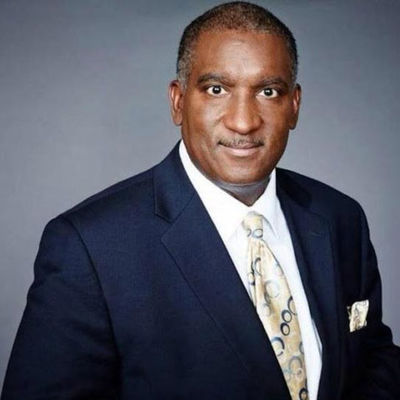 It was the week before Easter, in April 2007. I was in Chicago, closing out the cover of the June issue of Ebony magazine, where I was editorial director and editor-in-chief. I was also the president of the National Association of Black Journalists at the time.
It was the week before Easter, in April 2007. I was in Chicago, closing out the cover of the June issue of Ebony magazine, where I was editorial director and editor-in-chief. I was also the president of the National Association of Black Journalists at the time.
Those two aspects of my life would slam against each other over the next week, one that would change my life and those of hundreds across the country. And for one man, radio shock jock Don Imus, life would never be the same.
On Wednesday, April 4, the women of the Rutgers University basketball team were recovering from a 59–46 loss to Tennessee in the NCAA Women’s Basketball Championship final game the night before, when Imus took to the airwaves and called them “rough girls” and then “nappy-headed hos.” (His sidekick Bernard McGuirk also called them “hardcore hos” and compared them to the “jigaboos versus the wannabes,” referencing Spike Lee’s film “School Daze.” Most of the starting women on the Rutgers team were African American.
On Thursday, April 5, I received an email from NABJ board member Ernie Suggs alerting me to Imus’ comments (I, admittedly, was not a regular listener to his radio show, although it was simulcast on MSNBC as the morning show “Imus in the Morning.”) We quickly convened a conference call of our board of directors and decided his reprehensible comments could not go unanswered, and we set about drafting a statement from the organization.
Later that day, we sent out a strong response, calling for an apology from Imus, and encouraging all journalists to boycott his show until he owned up to his mess.
“Has he lost his mind?” I said in the statement. “Those comments were beyond offensive. Imus needs to be fired. Today.”
And then it was on.
Over the next few days, all I remember is a flurry of phone calls, emails and heated activity. That evening, I talked with Paula Madison. A veteran black journalist and once NBC’s highest ranking diversity officer, she was privately as incensed at Imus’ comments as we were. But she also knew there were internal stakeholders at the network who needed to hear from NABJ and others.
The next day Steve Capus, the then-president of NBC News (and now a good friend whom I greatly respect), called. When we talked Friday afternoon he told me, in no uncertain terms, that he, and NBC, were not at all happy with what their morning host had said and that he was “on it.”
In the meantime, it was clear that there was an internal fire at NBC, led by Al Roker, Madison and others, via their internal email system. Roker even went public on the “Today” show website demanding the Imus show be canceled on MSNBC.
On Saturday morning, while getting my kids ready for soccer, I got a call from Rev. Al Sharpton, the head of the National Action Network. I had met Rev. casually, but had never worked closely with him. My loss. He turned out to be a deliberate, smart, strategic partner in this fight. For nearly two hours, we talked about strategy, choreography and most importantly, how we each needed to ”stay in our lanes.” His was civil rights, activism and pressure on the advertisers. Ours was journalism, free speech and accountability.
On Easter Sunday, I missed church. Well, I went to church, but never made it inside. While my family was inside at the service, I stayed in the car, on the phone with a Sunday morning talk radio show in New York, talking about what Imus had said. Two more interviews would follow that afternoon.
The rest of that week moved quickly. On Monday morning, I flew to New York with NABJ Deputy Executive Director Ryan Williams (who would later go on to work at NBC), and met with Urban League president Marc Morial, did a live interview on NY 1, and then met with Les Moonves, the head of CBS (CBS owned Westwood One, the syndicator that distributed the Imus radio show across the country). In each meeting, we stuck to the same script: What Imus said was beyond insensitive and he had to go. Sure, he had a First Amendment right to say whatever he wanted, but companies such as NBC and CBS did not have an obligation to continue to pay him to say such garbage. Free speech comes with consequences.
Well, the rest, as they say, was history. On Wednesday, after a week of pressure, lobbying and nearly a dozen advertisers — from Sara Lee to American Express — pulling their ads from the show, Capus called me into his office as he announced MSNBC was firing Imus and cancelling “Imus in the Morning.” (Ironically, it created the opening for “Morning Joe” to take over that time slot, one it holds to this day.) CBS followed suit shortly thereafter and fired him from the syndicated radio show.
But no one wept for Don Imus. The 67-year old millionaire was going to be all right. He would later make a comeback on radio and then back on cable TV, this time on Fox Business. His show lasted for a few years before he announced his retirement in 2018.
As awful as the Imus episode was for the women of Rutgers University, for the hundreds of broadcast professionals who worked at NBC and CBS, and for the millions of listeners and viewers who had to endure his antics, the response by those who cared — black journalists, activists, corporations and listeners — showed that, in the end, the system worked.
Don Imus got his justice.
Bryan Monroe is an associate professor at Temple University’s Klein College of Media and Communication, where he leads courses in media, innovation, entrepreneurship and social change. Before joining Temple, he was most recently the Washington editor, opinion & commentary at CNN and the editor of CNNPolitics.com. He is also the managing director of Monroe Media Group, a Washington, D.C.-based media strategy, crisis communications and personal branding company.
Support Journal-isms(Last day to donate this year!)
Facebook users: “Like” “Richard Prince’s Journal-isms” on Facebook.
Follow Richard Prince on Twitter @princeeditor
Richard Prince’s Journal-isms originates from Washington. It began in print before most of us knew what the internet was, and it would like to be referred to as a “column.” Any views expressed in the column are those of the person or organization quoted and not those of any other entity. Send tips, comments and concerns to Richard Prince at journal-isms-owner@yahoogroups.com
View previous columns (after Feb. 13, 2016).
- Diversity’s Greatest Hits, 2018 (Jan. 4, 2019)
- Book Notes: Is Taking a Knee Really All That? (Dec. 20, 2018)
- Book Notes: Challenging ’45’ and Proudly Telling the Story (Dec. 18, 2018)
- Book Notes: Get Down With the Legends! (Dec. 11, 2018)
- Journalist Richard Prince w/Joe Madison (Sirius XM, April 18, 2018) (podcast)
- Richard Prince (journalist) (Wikipedia entry)
- February 2018 Podcast: Richard “Dick” Prince on the need for newsroom diversity (Gabriel Greschler, Student Press Law Center, Feb. 26, 2018)
- Diversity’s Greatest Hits, 2017 — Where Will They Take Us in the Year Ahead?
- Book Notes: Best Sellers, Uncovered Treasures, Overlooked History (Dec. 19, 2017)
- An advocate for diversity in the media is still pressing for representation, (Courtland Milloy, Washington Post, Nov. 28, 2017)
- Morgan Global Journalism Review: Journal-isms Journeys On (Aug. 31, 2017)
- Diversity’s Greatest Hits, 2016
- Book Notes: 16 Writers Dish About ‘Chelle,’ the First Lady
- Book Notes: From Coretta to Barack, and in Search of the Godfather
- Journal-isms’ Richard Prince Wants Your Ideas (FishbowlDC, Feb. 26, 2016)
- “JOURNAL-ISMS” IS LATEST TO BEAR BRUNT OF INDUSTRY’S ECONOMIC WOES (Feb. 19, 2016)
- Richard Prince with Charlayne Hunter-Gault,“PBS NewsHour,” “What stagnant diversity means for America’s newsrooms” (Dec. 15, 2015)
- Book Notes: Journalists Follow Their Passions
- Book Notes: Journalists Who Rocked Their World
- Book Notes: Hands Up! Read This!
- Book Notes: New Cosby Bio Looks Like a Best-Seller
- Journo-diversity advocate turns attention to Ezra Klein project (Erik Wemple, Washington Post, March 5, 2014)
Columns below from the Maynard Institute are not currently available but are scheduled to be restored soon on journal-isms.com.
- Book Notes: “Love, Peace and Soul!” And More
- Book Notes: Book Notes: Soothing the Senses, Shocking the Conscience
- Diversity’s Greatest Hits, 2015
- Diversity’s Greatest Hits, 2014
- Diversity’s Greatest Hits, 2013
- Diversity’s Greatest Hits, 2012
- Diversity’s Greatest Hits, 2011
- Diversity’s Greatest Hits, 2010
- Diversity’s Greatest Hits, 2009
- Diversity’s Greatest Hits, 2008
- Book Notes: Books to Ring In the New Year
- Book Notes: In-Your-Face Holiday Reads
- Fishbowl Interview With the Fresh Prince of D.C. (Oct. 26, 2012)
- NABJ to Honor Columnist Richard Prince With Ida B. Wells Award (Oct. 11, 2012)
- So What Do You Do, Richard Prince, Columnist for the Maynard Institute? (Richard Horgan, FishbowlLA, Aug. 22, 2012)
- Book Notes: Who Am I? What’s Race Got to Do With It?: Journalists Explore Identity
- Book Notes: Catching Up With Books for the Fall
- Richard Prince Helps Journalists Set High Bar (Jackie Jones, BlackAmericaWeb.com, 2011)
- Book Notes: 10 Ways to Turn Pages This Summer
- Book Notes: 7 for Serious Spring Reading
- Book Notes: 7 Candidates for the Journalist’s Library
- Book Notes: 9 That Add Heft to the Bookshelf
- Five Minutes With Richard Prince (Newspaper Association of America, 2005)
- ‘Journal-isms’ That Engage and Inform Diverse Audiences (Q&A with Mallary Jean Tenore, Poynter Institute, 2008)

